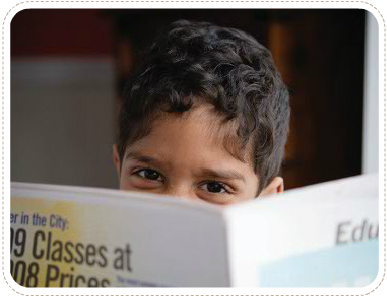


Sign up to receive our e-newsletters and make sure to read our blog. We'll feature a smorgasbord of facts, profiles, and stories about India and the rest of South Asia, as well as tips on how to bring culture, language, and history to your children. Informed parents, informed kids - a little gnaana for everyone.
And here are a few of our favourite resources. If you have a recommendation you would like to share, email us at inthegnaana@gnaana.com.
-

Do you trust the government with the tremendous responsibility of educating your children? There are alternatives, and this book summarizes over 20 of them - from the more commonly recognized approaches, such as Montessori and Waldorf, to the lesser-known Foxfire and Multiple Intelligences Education. A mind-opening resource for parents.
-

A comprehensive and critical study of Montessori philosophy and practice. This book details what goes on in a Montessori classroom, and it presents scientific studies that show how children learn best. It will also help parents distinguish between true and authentic Montessori schools and those that use the term "Montessori" in name only.
-

If you are lucky enough to get your hands on a copy of this rare gem - read it! Published in 1921, this book is an expose on the realities of the Raj by one of the world's most prolific historians. Durant - who chronicled the history of Western civilization in an ambitious 11-volume series - even went so far as to refer to what was happening in India as "the greatest crime in all history."
-

Gandhi. Once in a human history a man like him comes along. Enough said.
-

Sometimes the most insightful writings about a region come from those on the outside. This is certainly the case with Wolpert's biography of Mohammed Ali Jinnah. Jinnah's role in the freedom of the Indian subcontinent has often been marginalized, and his role in the subsequent partition has often been misunderstood. Wolpert's study is balanced and objective. A fascinating read about a man who changed the map of the world.
-

Modern challenges require, of course, modern parenting solutions. And in an increasingly materialistic and over-indulgent world, how can we impart in our children a sense of respect, ethics, and compassion? Drawing upon the Torah, the Talmud, and other important Jewish teachings, Dr. Mogel offers her answer to this dilemma. Her themes and recommendations are indeed universal. You may even be inspired to bring the weekly gusto of a Jewish-style Shabbat to your dinner table.
-

Six yards of cloth and six million stories…This book presents the sari as an organic cloth, with a mind and personality of its own. Part social anthropology and part women's studies, it features first- hand accounts of women who tell of their relationship with their sarees - of executives and maids, of new brides and new mothers, and of villagers and movie stars. A remarkable and truly special presentation of India’s most iconic garment.
-

In the era of Obama, it is hard to believe that apartheid in South Africa ended only in 1994. Mandela reveals his struggle to reconcile his admiration of Gandhi's non-violent approach in the face of a brutal regime that used violence against a voiceless people - whose plight was largely ignored by the international community. His story is a raw and exquisite inspiration to us all.
-

Good reads about India's history are hard to come by - and it's no wonder: India is a profoundly complex country with a rich and intricate past. Nehru's book is more of a documentation of his stream of consciousness - a collection of essays reflecting upon India's history and its pre-Independence challenges. The result is an amazing exploration into the depths of the Indian psyche.

